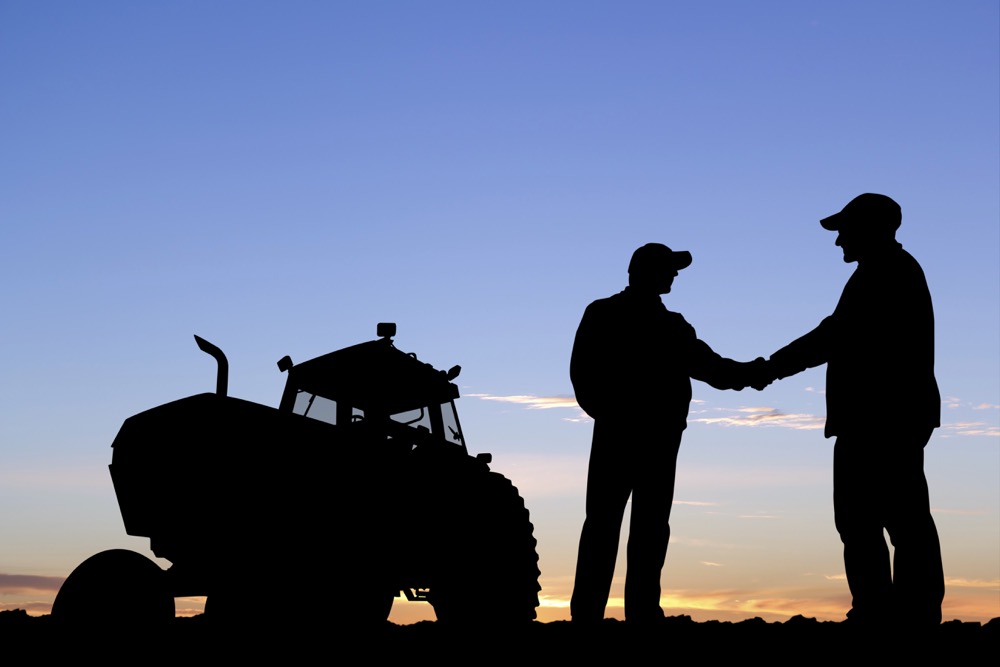It used to be a cheeky way of saying “C’mon, get over it.” Somebody might complain that you took the last donut, or that you stepped on their toe. And you’d reply, “So, sue me!”
Not anymore. Across farm country, the phrase now is deadly earnest. Farming is no longer the isolated, rural occupation it once was, and as a result, farmers are facing more potential risk from litigation than ever, and from more directions too.
In particular, more and more people with zero farm or rural background are living in close proximity to farms, which means farmers and farm practices are under increasing scrutiny from people who may not necessarily understand or accept them.
Read Also

Riding the tariff rollercoaster
Farmers are accustomed to roller-coaster years. But the current geopolitical windstorm is something else entirely. On his cattle operation near…
“First of all, farming is more complicated, and second, the litigation risk is closer to home than what a lot of people think,” says Robert Scriven, a partner at Oldfield, Greaves, D’Agostino & Scriven in Waterloo, Ont.
“The countryside is changing,” Scriven says. “You now have strangers beside each other with different views on topics such as drainage, farming practices, spraying, cutting trees, fence lines, and the like. So, although litigation is often thought of as this remote concept, involving remote actors such as conservation authorities or banks, it’s increasingly closer to home.”
And there’s more bad news too.
With so many non-farm and non-country people moving to rural communities, it’s also pushing the scale and complexity of the litigation, says John Goudy a partner with Scott Petrie LLP in London, Ont.
More non-farmers in the countryside, Goudy says, “exposes farms to litigation brought on by people who have less tolerance for various activities that may have been taking place over a long time with no complaints, which are suddenly a source of complaints.”
A changing regulatory environment
Regulations and laws are changing too, often in ways that are hard to keep up with as regulators, politicians and even farm organizations sometimes bow to pressure groups or set standards with, for instance, the goal of keeping Canadian farm commodities competitive in the marketplace.
“The larger and more technologically advanced the farm operation becomes, the more it can be exposed to litigation and increases in regulation,” Goudy says. “The more industrial a farm operation becomes, the less it’s treated as a farm and the more it’s treated as just another industry.”
Goudy says he sees such factors driving an increase in both litigation and regulatory action affecting farmers, who have to recognize that now, more than ever, they are at risk from both.

Workers know their rights
Farm employees, whether they are temporary, part-time or full-time and whether they are family or non-family are subject to rules and employment standards, and farm owners must ensure they know and understand what is expected of them as employers. Otherwise, they risk another source of litigation that is more prevalent than in the past.
There have been a number of cases successfully brought by migrant workers against farm employers in Canada and the United States, and recently, a temporary seasonal worker who contracted COVID-19 filed a legal challenge with the Ontario Ministry of Labour against an Ontario farm employer for compensation, claiming to have been fired and threatened with deportation because of speaking out about lack of measures taken by the employer to prevent workers becoming infected.
It’s a good example of how quickly things can change in today’s world, and why the safety and health of workers needs to be a priority for every farm.
“The rules with respect to labourers or employees have been changing over the years,” says Colin Simmons, barrister and solicitor with Counsel West Law in Calgary. “There are certainly sources of information out there, and it would behoove farmers to take a look at the type of regulations that are changing. If they have a lawyer that they can consult with, that’s probably a good source for them to go to and find out if they’re doing things properly or what changes they could make to ensure that they are.”
Families cause headaches too
Even families can cause litigation headaches for farmers, especially with higher land prices pushing up not just the value of their farms but also the expectations of farming and non-farming offspring, siblings and relatives when it comes time to transfer that wealth from one generation to the next.
Simmons sees more estate disputes cross his desk. “With a generation of baby boomers getting out of farming, there is a massive transfer of wealth occurring or going to occur, and that has led to a significant amount of litigation over the farming situation,” Simmons says. “Farming is unique in that you have a business, in a lot of cases, that the family owns, and while one or two children in the family want to farm, and need most of the assets to farm with, there are other non-farming children in the family who sometimes aren’t happy with the fact that their brother or sister is receiving more than they are. That certainly has been a problem in the past, and nowadays, with land values spiking, it’s just becoming more prevalent.”
“Without a doubt,” Scriven agrees. “If you are the older generation, get an estate plan done and revise it frequently, and ensure there is clear communication because if a son or daughter think that they’re taking over based on a conversation 20 years ago, and the parents are thinking something different, that’s a recipe for conflict.”
In today’s world, transition is rarely as black and white as simply selling the farm, he adds. “Often farms are incorporated, so there has to be a shareholder agreement, and it’s often a 10- or 15-year plan just because of the amount of money and the sophistication around it,” he says.
Scriven’s advice is to start the process as soon as possible, because he believes it’s an evolution rather than a transition.
“If it’s something that’s going to happen, you might as well work on it over a period of time because things will change,” he says. “Look at the last 18 months in terms of COVID, crop prices, land prices, equipment prices.
“And,” he adds, “I’m not convinced the world is a safer place now than it was two years ago, so there’s still fundamental political and economic stability issues.”
It’s always a good idea to start planning the farm transition to the next generation as early as possible, but for those farmers or families who have been hesitant to begin that process, it can become an impediment to actually getting started.
“A problem that some operations face is the fact that they haven’t started to plan already,” Goudy says. But, he cautions, “Not having looked towards transition shouldn’t be a reason to continue to procrastinate. Just because you haven’t already done it and you feel that you are behind, farmers and farm operations shouldn’t let that be a reason not to start now.”
There are regional drivers
Alberta’s oil industry is a warning flag. Litigation is on the rise, Simmons says. “A lot of oil companies are trying to reduce the annual rent that is paid on surface leases, and that is certainly leading to a lot of litigation, and you’re going to see that more in Alberta, of course, because we have a lot more of it than anywhere else,” he says. “Because oil and gas prices were low, some oil companies went or are going into receivership, and others just don’t want to focus right now on trying to clean up a lot of these wells that are old and causing some environmental concerns, so that type of litigation is becoming more prevalent.”
To try and avoid these kinds of litigation risks, Simmons suggests that when farmers or other landowners enter into these arrangements, they need to have properly structured, written agreements in place to ensure both parties know what is expected of them and can be held to account in the event of a dispute.
Unfortunately, many of the current arrangements date back several decades, so there are going to be a lot of challenges in the future.
“A lot of the disputes are arising with existing well sites and the environmental issues with respect to a lot of these sites is becoming a big issue,” Simmons says. “A lot of these wells were drilled back in the ’50s, ’60s and ’70s when they didn’t really do as good a job as they do today. If these well sites are leaking oil, and you end up with problems, there’s not much you can do to be proactive; you’re just going to have to deal with it when it arises. You may be able to approach your oil company to see if they’ll do something, but the law is such that in Alberta, there’s nothing requiring an oil company to reclaim a well site and that’s been a problem for a long time.”
It’s likely that there will be more and more agriculture-related litigation in the future, which means farmers need to make sure they stay informed and try to understand the risks that they can face. “If you’re running a farm, you’re running a business, and there are certainly rules and regulations, especially when it comes to the environment, food safety and things like that, that become tighter and tighter,” Simmons says. “You’re going to have to be more aware of that on the farm than you have been in the past.”
Keep out of court
It may be human nature to wait until we have a problem before seeking a solution, but when it comes to your litigation risk, that isn’t an argument that’s going to score you any points. Or save the farm.
With farm operations and farmers ending up in court more often, for myriad reasons, recognizing and being proactive about the potential for litigation is becoming another routine but vital aspect of risk management for today’s farm business.
“Nobody ever comes by my office just to tell me that things are good. They’ll typically come in when they have a problem already,” says Colin Simmons, a barrister and solicitor with Counsel West Law in Calgary. “But I do have, for instance in estate planning situations, people who come in every year or so to take a look at what they’ve done and see if there’s any changes required, and that’s a good approach.”
Relationships matter, adds Robert Scriven, a partner at Oldfield, Greaves, D’Agostino & Scriven in Waterloo, Ont. Farmers already know they need to have solid links to their accountant and to business advisors, he says. “Same with a lawyer; a lawyer that knows your operation and the family dynamic is important. A lot of my practice now is farmers calling me up and saying, what do you think of this? A lot of [litigation issues] are avoidable if you take a minute to think about it, and get some consults.”
Plus, says Scriven, “Paper wins litigations, so keep agreements, photographs, records and notes.”
It is important for farmers to seek out the right professionals and be educated. In effect, if you want a management role, you have to be able to perform it.
“Where successful farmers are separated from other farmers is their management skill and being able to identify what needs management, what needs their time and what they need to outsource or get professional help on,”Scriven says.
Get more formal
With more money at stake today, and with the complexity of farm operations, it also pays to have written agreements in place, whether it’s a transition plan, an employment contract, a rental or purchase agreement, or any other transaction that could be open to different interpretations without documentation.
“Where there’s a lack of documentation, that gives rise to litigation rather than avoids it,” says John Goudy a partner with Scott Petrie LLP in London, Ont. “A fair bit of litigation and disputes can be avoided through better documentation of agreements … at least if you have the bare bones of the agreement in writing there’s something that both parties can look to and rely upon.”
Also, make it a management principle that knowledge is power. Know what regulations you need to keep up with and stay abreast with them. Yes, it takes time. Monitor government notices, read updates from farm organizations, subscribe to ag publications, and invest time in keeping yourself in the loop.
The United States of Canada?
Is Canada heading down the same road as the United States? While researching this story, Country Guide looked into ongoing examples of farm litigation involving Canadian farms. Rather than focus on specific examples in this introductory article, we thought it best to stick to the overall trends.
One conclusion was glaring, though. If Canada is seeing a rise in farm litigation, it’s nothing compared to the tidal wave south of the border.
Are we heading that way too? Simmons doubts it.
“One of the issues in the U.S. is that they heavily use jury trials and they award unbelievable damages,” he says. “Here it’s not as prevalent; you don’t see a lot of civil cases, you’re not going to see juries. For the most part, you’re going to have just a judge who’s making the decision and isn’t likely to award $2 billion because somebody let the cattle out onto the road or something similar. There are places in the U.S. where essentially people can take their case from anywhere and juries, who essentially do this for a living, come out with unbelievable awards and the whole economy is centred around that. We don’t have that in Canada, and I don’t think you’re going to ever see the amount of litigation that you see down there.”
















